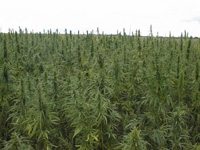Netherlands to extend its medical marijuana program

The Dutch Health Ministry said that it plans to extend its experimental medical marijuana program for five years.
Under the program, launched in 2003, standardized marijuana is grown by a government-licensed grower under controlled conditions and sold by prescription in pharmacies.
But few patients, even armed with a doctor's prescription, bought the regulated weed since they could buy it at a third of the price in "coffee shops," where it remains illegal but tolerated if sold in small amounts.
The medical marijuana plan was meant to allow the licensed grower, BMC, to build a customer base and eventually take over production from illegal growers. It also would give companies a chance to develop and register cannabis-based prescription drugs.
Health Minister Ab Klink said in a letter to parliament Wednesday that companies had made progress in drug development, and he wanted to give them more time to succeed.
"This development track will take years, but it can yield scientific evidence and give insight into the balance between safety and effectiveness of medical cannabis," he wrote.
"By making medical marijuana available as a raw material for five years, I want to give this track a serious chance."
Klink conceded BMC would have a surplus this year, and said he hoped a drug under development would eventually replace marijuana and the need for official growers.
The centrist government agreed as part of its coalition pact not to change country's famed tolerance policy on unregulated marijuana, which is rife with contradictions.
Advocates say full legalization would lead to better labeling of the plant's chemical contents.
And while coffee shops openly sell marijuana and hash, they have no way to legally source their products. Many are supplied by mini-plantations hidden in residential areas, causing a fire hazard. Police are called in to dismantle them on a daily basis.
Amsterdam benefits from tourists who come to smoke marijuana, but the city's emergency services are taxed by smokers who experience panic attacks after trying unexpectedly strong weed.
Border towns suffer problems from "drug tourists" who travel from neighboring Germany and Belgium and nearby France to stock up on weed.
Under the previous conservative government, parliament was dissuaded from outright legalization by fears that it would lead to a confrontation with the European Union.
According to data compiled by the Netherlands' Trimbos Institute for Mental Health and Addiction, after 30 years of the Dutch tolerance policy, usage rates here are somewhere in the middle of international norms - above those in Germany and the Scandinavian countries, but below those of France, Britain and the United States.
Subscribe to Pravda.Ru Telegram channel, Facebook, RSS!


